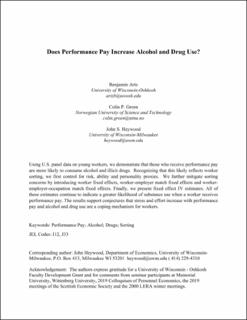| dc.contributor.author | Artz, Ben | |
| dc.contributor.author | Green, Colin | |
| dc.contributor.author | Heywood, John S. | |
| dc.date.accessioned | 2020-08-25T07:15:07Z | |
| dc.date.available | 2020-08-25T07:15:07Z | |
| dc.date.created | 2020-04-03T20:06:31Z | |
| dc.date.issued | 2020 | |
| dc.identifier.issn | 0933-1433 | |
| dc.identifier.uri | https://hdl.handle.net/11250/2673759 | |
| dc.description.abstract | Using US panel data on young workers, we demonstrate that those who receive performance pay are more likely to consume alcohol and illicit drugs. Recognizing that this likely reflects worker sorting, we first control for risk, ability, and personality proxies. We further mitigate sorting concerns by introducing worker fixed effects, worker-employer match fixed effects, and worker-employer-occupation match fixed effects. Finally, we present fixed effect IV estimates. All of these estimates continue to indicate a greater likelihood of substance use when a worker receives performance pay. The results support conjectures that stress and effort increase with performance pay and that alcohol and drug use is a coping mechanism for workers. | en_US |
| dc.language.iso | eng | en_US |
| dc.publisher | Springer Verlag | en_US |
| dc.title | Does Performance Pay Increase Alcohol and Drug Use? | en_US |
| dc.type | Peer reviewed | en_US |
| dc.type | Journal article | en_US |
| dc.description.version | acceptedVersion | en_US |
| dc.source.journal | Journal of Population Economics | en_US |
| dc.identifier.doi | 10.1007/s00148-020-00776-4 | |
| dc.identifier.cristin | 1805249 | |
| dc.description.localcode | "This is a post-peer-review, pre-copyedit version of an article. Locked until 25.6.2021 due to copyright restrictions. The final authenticated version is available online at: https://doi.org/10.1007/s00148-020-00776-4 | en_US |
| cristin.ispublished | false | |
| cristin.fulltext | postprint | |
| cristin.qualitycode | 2 | |
